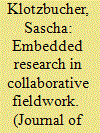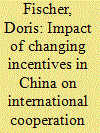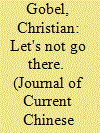| Srl | Item |
| 1 |
ID:
132730


|
|
|
|
|
| Publication |
2014.
|
| Summary/Abstract |
This paper discusses how cooperation between Chinese researchers and their foreign counterparts has changed. The paper draws on current literature and the author's experience as a researcher in the US and in China, arguing that while cooperation has increased overall, it has done so in ways that have crowded out old forms of cooperation or made them passé. The paper focuses particularly on how changes at leading Chinese research institutions have impacted international cooperation, both positively and negatively, and suggests ways in which foreign scholars might effectively pursue new avenues for cooperation and exchange.
|
|
|
|
|
|
|
|
|
|
|
|
|
|
|
|
| 2 |
ID:
132731


|
|
|
|
|
| Publication |
2014.
|
| Summary/Abstract |
In the era of the "scientific development concept" of the Hu/Wen leadership, agents of knowledge transfer that eventually translates into policy comprise not only think tanks for policy formulation in central-state institutions but also researchers in universities supporting policy implementation at local levels. Well-established patterns of local scientific advisory frame collaborative fieldwork in Sino-Western scientific projects on local governance. However, there is a gap between our active integration into these patterns during fieldwork and our ability to clarify them as resources, reconstruct the selection of research topics and contextualize the research results within our academic discourses. Analysing site-finding, data collection, aggregation and dissemination of a research project with Chinese public health researchers on rural health service reform in Xinjiang between 2005 and 2010, I argue that fieldwork and the role performed as a scientific advisor for the political principal is the localized and daily interface where politics crosses into science.
|
|
|
|
|
|
|
|
|
|
|
|
|
|
|
|
| 3 |
ID:
132729


|
|
|
|
|
| Publication |
2014.
|
| Summary/Abstract |
Over the past three decades, China's fast economic development has induced considerable changes in China's university and research institution landscape, research financing and academic career incentives. This paper argues that these changes have affected the motivation and the ways in which Chinese scholars engage in international research cooperation. Most recently it has been observed that strong pressures on scholars and scientists - especially at leading academic institutions - to excel in international publications while simultaneously fulfilling their obligation to generate income for their institutions can lead to a dilemma with regard to international research cooperation: Those institutions and scholars most interesting for foreign scholars to cooperate with may be the ones with the least amount of both incentive and time to enter into serious cooperation. This article invites us to reflect on the implications of these changes in the incentive structure for cooperation in social science research on China.
|
|
|
|
|
|
|
|
|
|
|
|
|
|
|
|
| 4 |
ID:
132732


|
|
|
|
|
| Publication |
2014.
|
| Summary/Abstract |
Field research in China often requires the researcher to cooperate with two kinds of actors: research collaborators, such as those at universities or official think tanks, and local officials. These actors facilitate or enhance field access, but such access comes at the price of a potential "pre-selection bias" in data collection. Some scholars have argued that dependence on these "gatekeepers" introduces a significant bias into research outcomes. I argue, however, that the constraints faced by China scholars in their field studies are not absolute, but function by degree. The CCP is monolithic neither in its organization nor in the thoughts of its agents, and close collaboration with local partners can help remove normative bias rather than necessarily introducing it. Most importantly, an argument built exclusively on the power of structural constraints discounts China scholars' most crucial abilities: to learn, to think critically and to research holistically.
|
|
|
|
|
|
|
|
|
|
|
|
|
|
|
|